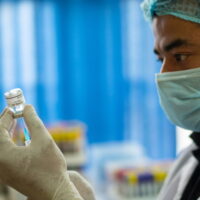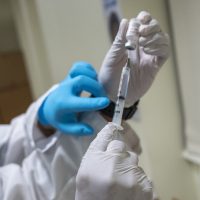A video making the false claim that the Pfizer CEO “refuses” to get a COVID-19 vaccine has been circulating on Facebook. But the pharmaceutical company’s chief executive has said that he’s gotten his first shot.
Misconception: COVID-19 Misconceptions
Texas Doctor Spreads False Claims About COVID-19 Vaccines
Federal officials authorized two mRNA vaccines for COVID-19 after they were determined to be safe and effective against symptomatic illness in clinical trials. But a Texas doctor, in a widely shared video, falsely claims the vaccines don’t provide protection and that they’re actually “experimental gene therapy.”
Posts Distort CDC Study Supporting Mask Mandates to Reduce COVID-19
A study from the Centers for Disease Control and Prevention found that state-issued mask mandates were associated with significant decreases in daily COVID-19 case and death growth rates. Yet some conservative outlets and social media users falsely claim the study shows mask mandates have a negligible impact on COVID-19 outcomes.
Instagram Post Misrepresents FDA Document About Monitoring Vaccine Safety
Hagler’s Widow Refutes Rumors About How He Died
RFK Jr. Video Pushes Known Vaccine Misrepresentations
What evidence supports the use of face masks against the coronavirus?
Multiple lines of evidence back the use of face masks to protect against the coronavirus, although some uncertainty remains as to how effective mask interventions are in preventing spread in the community.
Lab tests, for example, show that certain masks and N95 respirators can partially block exhaled respiratory droplets or aerosols, which are thought to be the primary ways the virus spreads.
Observational studies, while limited, have generally found mask-wearing to be associated with a reduced risk of contracting the virus or fewer COVID-19 cases in a community.
SciCheck Video: How Viral Deceptions Spread
Video Targets Gates With Old Clip, Misleading Edit
In a 2010 TED Talk focused on developing new technologies to drastically reduce carbon dioxide emissions, Bill Gates briefly mentioned reducing the rate of population growth. A conspiratorial video circulating on Facebook misleadingly edits Gates’ talk to suggest his “wish” was to depopulate the planet through vaccines.
What does it mean to say a vaccine has 94% percent efficacy or higher?
Efficacy is a measure of how well a vaccine performs in a clinical trial. It specifically refers to a relative reduction in infection or disease when comparing the vaccinated group to the placebo (or control) group.
For instance, both the Pfizer/BioNTech and Moderna vaccines were primarily evaluated for their ability to prevent symptomatic COVID-19, with the former having a 95% efficacy and the latter having a 94% efficacy in the clinical trial data submitted for the original authorization by the Food and Drug Administration.







